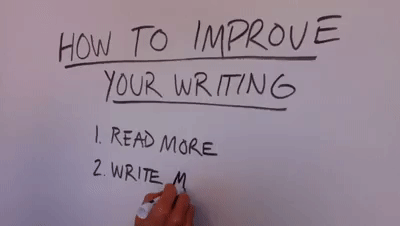Data Scientists should be the professionals with most written documents today
This is a bold statement. But we’ll back it up entirely – don’t you worry. Communication skills in Data Science are fundamental.
Data Science is the field to follow nowadays. It’s growing, it’s all around us, “there is data all around us”, right? It seems everybody is trying to get on board with this trend and finding ways on how to hop on to the Data Science conversation.
But let’s stop for a second.
In a world where everybody seem’s to be trying to write something or finding something to say about Data Science…
Who should be doing the writing?
This post will make a case as to why Data Scientists should get out of their (relatively newly acquired) comfort zones, and start getting their hands dirty and get writing – there’s no better way to put it.

You’ll learn that by developing a constant habit in writing, sharing ideas, researching and learning how to properly communicate will do wonders for your Data Science career. (trust us, we are not exaggerating).
Ready for this?
Great, let’s go!
Why writing?
In brief: There are countless benefits to writing, with a proven track record and direct correlation that whoever creates, cultivates and keeps a habit of writing has a great chance to do better – professionally.
“What?” – you might be wondering.
Yep.
You see there are tons of benefits to writing. There are much better blogs that can support this statement, but here are a couple of benefits that we can easily point out:
- Eliminate Stress
- Learn more
- Be happier
- Be more focused
- Create many memories
(If you want to check out more, click here: https://facilethings.com/blog/en/benefits-of-writing)
And we believe, that writing not only can give you all of the previously mentioned benefits, there are tons more!

Many, specifically tailored to Data Science and your future Data Science career.
How writing relates to Data Science
Data Science is a field that is pretty much the “New Kid on the Block” or “Rookie” in the technological field.
To make a sports analogy: Data Science has all the potential to become one of the greats, and is already showing some great promise in its early years, but it still has to prove itself to everybody and keep a healthy career in order to make this happen.
Bringing it back to more common terms: Data Science has to keep on growing the way it has been, but, in order to do so, it must keep up this pace for a good enough time as well.
How can this happen?
One way to do so is: Writing.
Traditionally, every field from almost every industry is divided into 2 main sub-sections: Research & Business.
In most cases, Research is ahead of the curve in relation to Business, it sets out the field and explores the wonders of the unknown – while Business follows by and builds upon what has proven to work and work well.
But, as with many things: Data Science is the exception.
You see – Data Science is a field that is evolving as we speak. Literally. This means that there is no difference between Research and Business, as they are practically developing at the exact same time, both are setting the grounds for the future as they go.
There is little room for testing beforehand, everything must be done and then wait for the repercussions.
We are literally discovering the next big thing in Data Science as we work, so in a sense:
We are all researchers, innovators and inventors.

So why is this important?
In order to avoid a total catastrophe, where we wonder in circles and take the wrong steps. We must counter the repercussions, whichever they may be.
How can we do this?
Mitigating possible mistakes and growing the field of Data Science in a communal manner.
Data Science has been a historically communal field of work, as most of the modern day fields that revolve around technology (and the internet), we all understand that our strength lies in numbers. There are hundreds of crowdsourcing websites where people gather, learn, discuss, and solve problems together, being able to build stronger algorithms that if they had done otherwise.
This has to stay the same – but we should definitely add more wood to the fire.
And writing down what we’ve been through is a fantastic way to accomplish this.
Think about it…
If we as Data Scientists begin to write down and keep track of the different little projects that each is executing, (not only the ones that we are particularly proud of), then who knows?
Maybe your project might be the exact missing piece that in individual half-way around the work precisely needed to build his very own little project.

Maybe the problem that has been making you want to hit your head against the wall every time you look at it, might be something that someone already solved a while back.
We are stronger if we build this field together.
Let’s think of an example: Waze.

Waze is a transportation app that was introduced in 2013 and its main focus is for people to get where they want to go in the best possible route and in the shortest amount of time. It has complex algorithms that simultaneously calculate different route alternatives and makes this happen.
But…
It relies on user data as well.
Waze can work with the information they have on traffic, traffic camera patterns, historical data, etc. But in order to have a more efficient proposed route it must rely on up-to-date information that is gathered by user participation.
Ironically, (or not) Waze generally works best in cities that already are drowned in bad traffic, both because there is a bigger necessity for the users to arrive on time, but most importantly:
Because people use the app actively.
They report holes, accidents, unusual traffic jams, driving speed, etc. – thus helping out as many people as possible to solve a bigger issue at hand.

If we take this into account, we will not only create more, and better things together, we will also be able to avoid the mistakes that others have already commited.
Let me repeat that since it’s very important:
If we methodically document what we are doing, we will be able to face a similar situation that someone else has already faced, learned from their mistakes and get their learnings, and avoid them, to (possibly) take the right decision.
This is truly powerful (and valuable).
How writing can affect your career
This is what we wanted to discuss – there are MANY reasons how writing could positively affect your career, specifically.
Apart from the aspects mentioned above (improving your memory, creativity, out-of-the-box thinking and such), writing can actually help you move forward in your career.

How?
Two ways:
- Promoting Yourself
- Improving Your Skills – (in one of the weakest aspects of most Data Scientists today)
(these are big statements to fill, but stay with us, we’ll get there)
Promoting yourself
Being involved in a field that revolves around the internet, means that there are also great opportunities to establish yourself as a brand in the world wide web.
Many very well known Data Scientists are already involved in blogging, where they take advantage of their Data Science skills and the experiments that they have made during the years and show them to the world.
Many of our guests in the SuperDataScience Podcast mention this as one of the factors that can help you really stand out. (Check out Episode 81 for more!: https://www.superdatascience.com/data-visualization-training/)
Visual fields within Data Science seem to be some of the favorites, but there is really no limit or guideline to follow.
Remember: we are building Data Science as we grow, so any way can be the right way.
Creating a relationship with headhunters
Job recruiters often take a peak in Blogs from Data Scientists to check out not only their ability and technical capabilities in the role they might be able to fulfill.
“Blogs are great places to get to know the person behind the skills” Data Science Headhunter Urie Suhr says.
“It is also a great measure to understand the interests of the person as well as how dedicated and just how much he/she enjoys tweaking around with programs. We consider everything from theme to the amount of times (how active) they might be on their website”.
(For more on what a Headhunter is looking for, check out Episode 101 of the SuperDataScience Podcast here: https://www.superdatascience.com/podcast-data-science-headhunter-looking/).
There are tons of options available for you to choose, just take your pick and get to work!
Improving your skills
We hope you are already familiar with the Data Science Process.
It’s a must for every Data Scientist and aspiring Data Scientist to understand.
- Identify the Question
- Prepare the Data
- Analyse the Data
- Visualize the Insights
- Present your Findings
To summarize the most aspect of it (Step #5) is communication.
You might think that the role of a Data Scientist is analyzing loads of incomprehensible data and figuring out that fundamental piece of information that was missing from the picture and having that “Eureka” moment.
We’ve got news for you:
It doens’t stop there.
A completely vital aspect of a Data Scientist is to be able to communicate this piece of information to the people who will receive this information – the company’s shareholders.
No matter how important that missing piece of information might be, the bottom line is:
If you can’t communicate it properly, it’ll fall into deaf ears.
There is a slight distinction between Writing and Oral communication – we are aware of this. But this doesn’t mean that both don’t go hand in hand.
Think about it:
If you learn how to jot down your ideas, in a structured, coherent manner, and communicate them properly (in any specific format) you will be able to translate this into valuable insights that will be heard.

In conclusion
Just because meany people aren’t considering writing as a fundamental piece in the development of their Data Science career – this doesn’t mean you should look the other way.
From a competitive side:
Looking in the right direction when others are looking in the oppposite, will only help you stand out and learn skills that others are dismissing.
From a non-competitive side (more important):
We are all involved in this wonderful world of Data Science, no matter your current role, job or interest.
The truth is, Data Science would not be where it is if it weren’t for a bunch of people working together, let’s keep that ball rolling, we are on to wonderful things.
We are all the Data Science Movement.
So…
let’s write.


